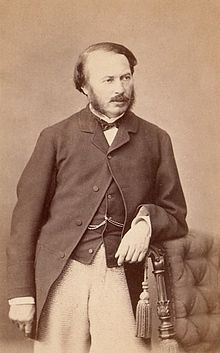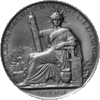
Jean-Gilbert Victor Fialin, Duc de Persigny (11 January 1808 – 12 January 1872) was a statesman of the Second French Empire.
Biography
Fialin was born at Saint-Germain-Lespinasse in the Loire, where his father was Receiver of Taxes, and was educated at Limoges. He entered Saumur Cavalry School in 1826, becoming Maréchal des logis in the 4th Hussars two years later. The role played by his regiment in the July Revolution of 1830 was regarded as insubordination, resulting in Fialin being dismissed from the army. He then became a journalist, and after 1833, a strong Bonapartist, assuming the style vicomte de Persigny, said to be dormant in his family.
He was involved in the abortive Bonapartist coups at Strasbourg in 1836 and at Boulogne-sur-Mer in 1840. After the second coup, he was arrested and condemned to twenty years' imprisonment in a fortress, commuted to mild detention at Versailles. There he wrote a book to prove that the Egyptian pyramids were built to prevent the Nile from silting up. The book was published in 1845 under the title De la destination et de l'utilité permanente des Pyramides.
During the 1848 Revolution, Fialin was arrested by the Provisional Government. After his release, he played a prominent part in securing Prince Louis-Napoleon Bonaparte's election to the presidency. Together with Morny and Marshal Saint Arnaud he plotted the Restoration of the Empire, and was a devoted adherent of Napoleon III. He succeeded Morny as French Minister of the Interior in January 1852, and became senator later that year. He resigned in 1854, and was appointed Ambassador to London the next year, a post he occupied with a short interval (1858–1859) until 1860, when he resumed the portfolio at the Interior Ministry. But the growing influence of his rival Rouher prompted his resignation in 1863, after which Napoleon created him a duke.
A more dangerous enemy than Rouher was Empress Eugénie, whose marriage Fialin had opposed and whose presence on the Council he deprecated in a memorandum which was leaked to the Empress.
He sought in vain to see Napoleon before the Franco-Prussian War in 1870, and the breach was further widened when the master and servant were in exile. Persigny returned to France in 1871 and died in Nice on 12 January 1872.

A devoted and fanatical follower of Louis-Napoleon, whose service dated back to the future Emperor's wilderness years of exile and imprisonment, Persigny stood out among the Emperor's motley political entourage as the most passionate ideologue of Bonapartism. The Emperor's famous wry comment: "The Empress is a Legitimist, Morny is an Orleanist, Prince Napoleon is a Republican, and I myself am a Socialist. There is only one Bonapartist, Persigny – and he is mad!"
References
- ^ Chisholm 1911.
- Jerrold, Blanchard (1882). The Life of Napoleon III. London: Longmans, Green. p. 378. Retrieved 18 September 2011.
 This article incorporates text from a publication now in the public domain: Chisholm, Hugh, ed. (1911). "Persigny, Jean Gilbert Victor Fialin, Duc de". Encyclopædia Britannica. Vol. 21 (11th ed.). Cambridge University Press. p. 252.
This article incorporates text from a publication now in the public domain: Chisholm, Hugh, ed. (1911). "Persigny, Jean Gilbert Victor Fialin, Duc de". Encyclopædia Britannica. Vol. 21 (11th ed.). Cambridge University Press. p. 252.
Further reading
- Mémoires du duc de Persigny (2nd ed., 1896), edited by Count Henri de Laire d'Espagny, his former secretary.(in French)
- Le duc de Persigny et les doctrines de l'empire (1865), a eulogistic life by Persigny and Joseph Delaroa.(in French)
- L'empire libéral, études, récits, souvenirs (1895), by Emile Ollivier.(in French)
| Political offices | ||
|---|---|---|
| Preceded byCharles Auguste, duc de Morny | Minister of the Interior 1852–1854 |
Succeeded byAdolphe Billault |
| Preceded byAdolphe Billault | Minister of the Interior 1860–1863 |
Succeeded byPaul Boudet |
| First and Second Cabinets of Louis Napoleon Bonaparte (3 December 1851 – 2 December 1852) | ||
|---|---|---|
| Minister of State |  | |
| Justice | ||
| Foreign Affairs | ||
| Interior and Beaux-Arts | ||
| Police | Charlemagne de Maupas (1852) | |
| Defense | Jacques Leroy de Saint Arnaud | |
| Navy and Colonies | Théodore Ducos | |
| Public Education and Religious Affairs | Hippolyte Fortoul | |
| Public Works | ||
| Agriculture and Commerce | ||
| Third cabinet of Napoleon III (2 December 1852 - 17 July 1869) | ||
|---|---|---|
| President of the Council of State |  | |
| Justice | ||
| Foreign Affairs | ||
| Interior | ||
| Police | ||
| Finance | ||
| Defense | ||
| Marine, Colonies and Algeria | ||
| Education and Cults | ||
| Public works | ||
| Agriculture and Commerce | ||
| Beaux-Arts | ||
| Emperor's Household | ||
| Ministers of State | ||
| Ministers without portfolio | ||
| Preceded by Second cabinet of Louis Napoleon • Followed by Fourth cabinet of Napoleon III | ||
- 1808 births
- 1872 deaths
- People from Loire (department)
- Dukes of Persigny
- Counts of Persigny
- Bonapartists
- French interior ministers
- Ministers of agriculture and commerce of France
- Members of the National Legislative Assembly of the French Second Republic
- Members of Parliament for Nord
- French senators of the Second Empire
- French general councillors
- Mayors of places in Île-de-France
- Ambassadors of France to the United Kingdom
- 19th-century French diplomats
- French Army officers
- Grand Cross of the Legion of Honour
- Grand Crosses of the Order of the Dannebrog
- Recipients of the Order of the Medjidie, 1st class